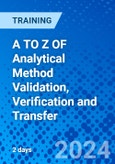Reliable analytical results are necessary to make informed decision about the quality and safety of the products in the pharmaceutical industry. In addition, such analytical data are required for regulatory submissions in support of the drug product registrations. Therefore, meaningful experimental designs including system suitability parameters must be planned for the intended use of the procedure.
In this course, general guideline for the determination of the analytical characteristics for different types of validation procedures is highlighted for the analysis of both the drug substance and drug product. The factors to consider for verification of the compendial procedures will also be discussed. In addition, different approaches for the transfer of analytical procedure from one lab (transferring) to other lab(s) (receiving) under different circumstances will be covered. Other related topics for obtaining reliable data will also be discussed. These topics include analytical instrument qualification as well as how to set, handle and monitor specifications.
Due to global nature of pharmaceutical industry, other quality topics on both regulatory (ICH) and compendial (USP) harmonization are also covered. These topics are valuable for scientists directly or indirectly involved with the drug development, analysis. stability studies or regulatory/compendial submissions.
This course is based on a recent book entitled'Pharmaceutical Analysis for Small Molecules' by Dr. Davani which was published by Wiley in 2017. In addition, examples and case studies will be provided based on insights and extensive experience in developing and implementing these topics in industry/pharmacopeia. Guidance and advice will also be provided based on interactions with global pharmaceutical industry, FDA and other regulatory authorities worldwide.
SEMINAR OBJECTIVES
- Drug Approval Process and Regulatory Requirements (private standards)
- Pharmacopeias and Compendial Approval Process (public standards)
- Compendial Harmonization Process
- Chromatography System Suitability Requirements
- Allowed Adjustments of Chromatographic System Parameters
- Analytical Instrument Qualifications including DQ, IQ, OQ, PQ
- Analytical Method Validation
- Analytical Method Verification
- Analytical Method Transfer
- Alternative to Official procedure and options
- Analytical Procedure Life Cycle
- How to Set Specifications and how to handle out-of-specification (OOS) and out-of-trend (OOT) results
Course Content
Speakers
Kelly ThomasMs. Thomas has over two decades of cGMP hands-on industry experience in both pharmaceutical and medical device manufacturing operations. Her experience covers all Quality Systems; as well as, all areas of validation; including, process/product validation, facilities validation, CSV and 21 CFR Part 11, test method validation, equipment/automated processes and cleaning validation.
Utilizing strategic thinking, risk based approaches, and Lean principles, she has demonstrated success in steering and managing complex projects within the pharmaceutical and medical device industries.








